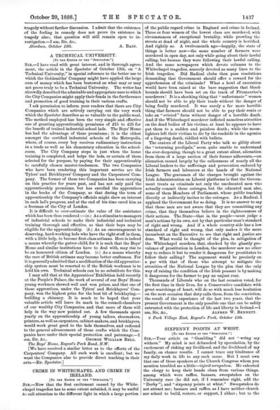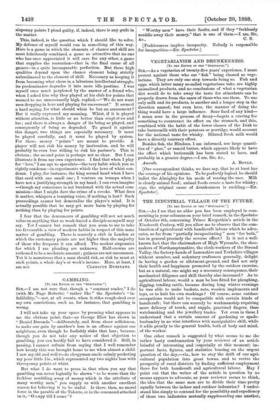SIXPENNY POINTS AT WHIST.
[To TIM EDITOR 07 THE "SPECTATOR."] Sin,—Your article on " Gambling " did not "wring my withers." My mind is not debauched by speculation, by the excitement of risking my livelihood, and the livelihood of my family, on chance results. I cannot trace any hindrance of my daily work in life to any such cause. But I must own that one of those speakers at the Church Congress whom you mention troubled me a little—injecit scrupulum. He exhorted the clergy to keep their hands clean from various things, among which were raffles, bazaars, sweepstakes on the University race (he did not, if ' I remember right, add the " Derby "), and "sixpenny points at whist." Sweepstakes do not attract me ; bazaars and raffles, as I have neither church nor school to build, restore, or support, I abhor ; but to the
sixpenny points I plead guilty, if, indeed, there is any guilt in the matter.
This, indeed, is the question which I should like to solve. My defence of myself would run in something of this way. Here is a game in which the elements of chance and skill are most felicitously combined, a game so attractive that no one who has once appreciated it will care for any other, a game that supplies the recreation—that is, the final cause of all games—in a quite incomparable perfection. But these high qualities depend upon the chance element being strictly subordinated to the element of skill. Necessary as keeping it from becoming what chess is, a laborious intellectual struggle, its predominance degrades it into mere idle pastime. I was myself once much perplexed by the answer of a friend who, when I asked him why they played at his club for points that seemed to me unnecessarily high, replied,—" We do not want men dropping in here and playing for amusement." It seemed a hard saying, for what should whist be but an amusement ? But it really expressed my meaning. Whist, if it is played without attention, is little or no better than vingt-et-un and loo ; and there is always a danger of its being so played, and consequently of being so degraded. To guard it against this danger, two things are especially necessary. It must be played carefully, and it must be played by system. For these, money " points " are meant to provide. A player will not risk his money by inattention, and he will probably be even less willing to risk his partner's. This is obvious ; the second point is perhaps not so clear. But I can illustrate it from my own experience. I find that when I play for "love," lam apt to speculate—the very habit which you so rightly condemn—in experiments which the laws of whist con- demn. I play, for instance, the king second hand when I have that card with one small one ; I venture on trumps when I have not a justifying strength in my hand ; I can even imagine —though my conscience is not burdened with the actual com- mission—that I might dare the crime of a revoke. What does it matter, whispers a tempting voice, if nothing is lost? Such proceedings cannot but demoralise the player's mind. It is actually possible that he may get more harm by playing for nothing than by playing for points.
I fear that the denouncers of gambling will not set much value on anything that so weak-kneed a disciple as myself may say. Yet I cannot but remark that you seem to me to take too favourable a view of modern habits in respect of this same matter of gambling. There is scarcely a club in London at which the customary points are not higher than the majority of those who frequent it can afford. The modest sixpennies for which I am pleading are unknown. Half-crowns are reckoned to be a moderate amount; guineas are not uncommon. Yet it is monstrous that a man should risk, as risk he must at such points, a whole day's or week's income. Here, at least, I



































 Previous page
Previous page